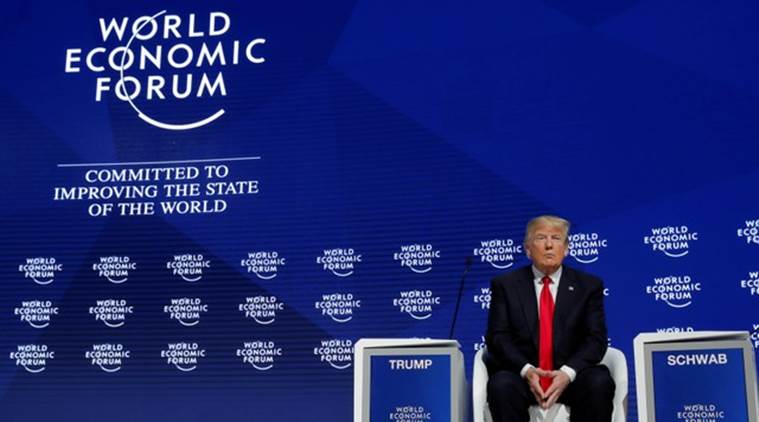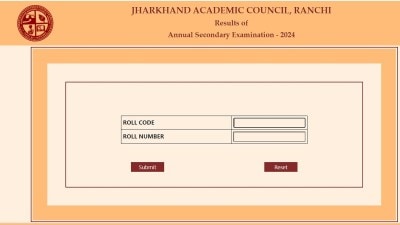- India
- International
Raja Mandala: Delhi-Davos disconnect — India must finds ways to take advantage of new opportunities
Given its growing stakes in the global economic order, Delhi ought to be at the leading edge of the current debate on the future of capitalism. India, though, seems too preoccupied sorting out the persistent legacies of feudalism.
 US President Donald Trump at World Economic Forum summit in 2018. (Source: Reuters)
US President Donald Trump at World Economic Forum summit in 2018. (Source: Reuters)
As the world’s business elite, political leaders and the chatterati show up at the annual Davos conclave in the Swiss Alps this week, the talk is about “stakeholder capitalism”. Klaus Schwab, who founded the World Economic Forum 50 years ago, wants capitalists to look beyond their shareholders and consider the interests of all the stakeholders. Some hope that the debate on stakeholder capitalism is a long overdue recognition of the capitalist excesses of recent decades. Last August, the Business Roundtable in the US, which brings together some of the top American corporates, said American companies must now generate value for customers, invest in their employees, deal fairly with suppliers and support the communities in which they operate even as they service their shareholders.
Sceptics, however, dismiss this as a gimmick. “Stakeholder capitalism,” they say, is a nice way of saying the right things, repackaging old ideas on corporate social responsibility and creating illusions about reforming capitalism. Cynics insist that it will be business as usual for the world’s capitalists.
Beyond this divide between optimists and pessimists, there is no question that the discourse on “stakeholder capitalism” is a reflection of the deeper crisis afflicting the global economy today. In its annual survey on global risks, the WEF has identified many challenges. Three of them stand out and relate to polarised politics in major industrial societies, trade wars and technological change.
US President Donald Trump, who is joining Davos this year, is at the heart of the wrenching debates on all the three issues. Trump’s politics have been defined by his trenchant opposition to “globalism” — exemplified by the Davos gathering. As he brushes off the impeachment trial in the US Senate and begins his campaign for a second-term in the White House, which many fear could well be successful, there is great interest on what he has to say on key global issues.
On political polarisation in America, Trump is unlikely to be defensive. While the dominant sentiment at Davos sees Trump as the very embodiment of nationalism and populism that are polarising politics around the world, others point to the structural conditions that have bred these forces. They suggest Trump has merely mobilised these popular resentments. As Robert Reich, who served as Secretary of Labour in the Bill Clinton Administration put it recently, “Trump’s support comes largely from America’s working class whose wages haven’t risen in decades, whose jobs are less secure than ever and whose political voice has been drowned out by big money”.

As the Democratic Party abandoned its traditional working class supporters, Trump drew them towards the Republican Party — long seen as the party of the rich. His political genius lies in simultaneously appealing to both capital and labour — massive tax cuts to the former and the promise to the latter of bringing jobs back to America that were lost through globalisation and immigration.
Much the same happened in the British elections last year, where the Tory leader Boris Johnson won a sweeping mandate by breaking into the working class strongholds of the Labour Party. Trump’s success in mobilising the working people was tied to challenging the logic of globalisation that was taken for granted by the Democratic Party, large swathes of American capital and the policy wonks.
Long before the 2016 election, Trump had a long record of denouncing free trade. His attack on globalism was mistaken by many as an electoral ploy rather than a considered strategy. Many had hoped that Trump will moderate his anti-globalist rhetoric once in office. Instead Trump has taken a pickaxe to the core principles of the globalised economic order — free trade, open borders and multilateralism.
Anti-globalisation protests have become common over the years at the annual gatherings of Davos as well as the G-7 and G-20 summits. But few had anticipated that the president of a country, long the champion of globalism, would be at the forefront of dismantling it. Many had also hoped that Trump’s war against global trading regime would come a cropper, for it was assumed that the cost of uncoupling with the global economic order would be too costly.
But Trump, who is scheduled to speak on Tuesday at Davos, could well boast about his successes on the trade front. He has renegotiated a 25-year old trade agreement with America’s neighbours, Canada and Mexico. Trump’s threat of an all-out trade war with China over the last couple of years has led to an interim agreement that commits Beijing to reduce its trade surplus with the US by importing more.
At Davos, Trump is also expected to turn his ire on the EU, which has a near $200 billion trade surplus with the US. Trump has often said the EU treats America “worse than China”.
The trade wars among the world’s major capitalist centres is accentuated by the technological revolution, especially in the digital domain. The Davos report on global risks argues that the realisation of the full potential of new technologies depends on unprecedented coordination among all stakeholders. What is emerging instead is “digital fragmentation” marked by the extension of geopolitical and geo-economic rivalries into the new domain. Digital issues have come to the front and center of American arguments with both and Europe.
Given its growing stakes in the global economic order, Delhi ought to be at the leading edge of the current debate on the future of capitalism. India, though, seems too preoccupied sorting out the persistent legacies of feudalism. But sooner than later, India must find ways to take advantage of the new opportunities from the unfolding rearrangement of the global capitalist system.
This article first appeared in the print edition on January 21, 2020 under the title “Delhi-Davos disconnect”. The writer is Director, Institute of South Asian Studies, National University of Singapore and contributing editor on international affairs for The Indian Express.
EXPRESS OPINION
More Explained
Apr 19: Latest News
- 01
- 02
- 03
- 04
- 05









































